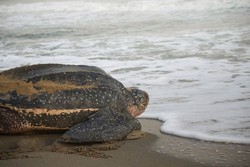Impact of climate change on sea turtle populations
Climate change will affect sea turtles in a number of ways, such as the loss of nesting areas as sea levels rise. It will also affect the temperature of the sand in which the eggs incubate, resulting in more female hatchlings due to the phenomena known as temperature-dependent sex determination (TSD). Furthermore, reproductive output will be reduced due to increased mortality of eggs and hatchlings. The EU-funded project SEATURTLES (Climate change and sea turtles) studied leatherback turtle populations (Dermochelys coriacea) on the Pacific coast of Costa Rica, and tested the effects of climate and climate change on other turtles that nest in the region. Scientists also developed a theoretical framework to explain the adaptive significance of TSD under natural climatic fluctuations. Scientists compared daily and seasonal temperature fluctuations in the nest environment and mean temperature. They found that thermal stability increased with depth, affecting hatching success and the transitional range of temperature over which both sexes are produced. The SEATURTLES team created a population model using the leatherback turtle population nesting in Costa Rica based on the relationship between air temperature and nest temperature. The adaptive significance of TSD was tested by allowing sex ratios to change with temperature, or by maintaining fixed sex ratios as if turtles had genotypic sex determination. Finally, researchers determined the effectiveness of TSD in maintaining populations under different climate change scenarios. It was found that TSD provides an evolutionary advantage to sea turtles by mitigating the effects of raised temperatures by producing more females and therefore increasing future reproductive rate (fecundity). However, TSD will become inefficient as global temperatures rise to the levels predicted by current climate change models. SEATURTLES findings contribute to a clearer understanding of the effects of climate change on biodiversity and reinforce Europe’s role as a leader in climate change research.
Keywords
Climate change, sea turtle, temperature-dependent sex determination, SEATURTLES, leatherback turtle

